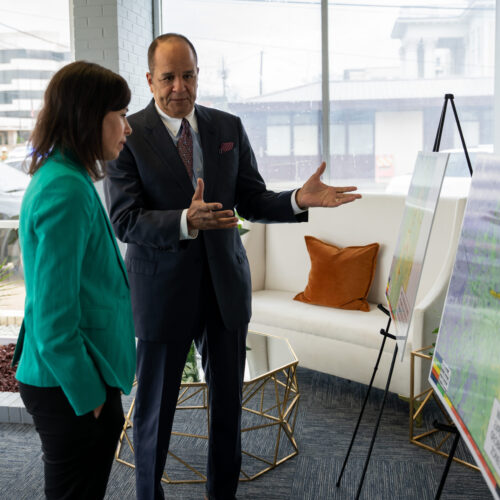
As FCC Chairwoman Jessica Rosenworcel stands on the precipice of reopening the FM geo-targeting debate, she took the opportunity to visit one of the stations the FCC used for its geo-targeting pilot program during a trip to Jackson, MS.
In 2022, the FCC selected Roberts Broadcasting’s 97.7 WRBJ as one of two stations to explore hyperlocal content delivery, this one around Jackson State University. WRBJ utilizes FM boosters to broadcast targeted content like weather updates, traffic reports, and localized news within specific areas of its broadcast range.
Chairwoman Rosenworcel discussed the trial at length with Roberts Broadcasting President and Owner Steve Roberts.
Roberts said, “For years, we faced challenges competing with larger broadcast groups. During the testing, the technology not only improved our market coverage and revenue but also allowed us to support small businesses in our community by making advertising options more accessible and affordable.”
“As the FCC continues to push for advancements in broadcasting technology, the success stories from WRBJ Radio stand as a testament to what the future of radio could hold for minority groups and underserved communities across the nation.”
While yet unreleased to the public, Chairwoman Rosenworcel has been circulating a new Notice of Proposed Rulemaking that would permit FM broadcasters to deliver geo-targeted content for portions of their broadcast hour, according to a statement by Commissioners Brendan Carr and Geoffrey Starks.
Despite previous opposition from the National Association of Broadcasters and concerns about potential impacts on advertising rates and minority-owned stations, advocates like the US Black Chambers and NABOB see it as a means to offer tailored information and news across diverse communities.







If the FCC is to proceed with proposing to allow FM boosters to originate different programming, the same NPRM should likewise propose for FM translators the same ability to originate programming. FM translators are governed by rules almost identical to FM boosters and, as a technical and operational matter, the only difference between FM boosters and FM translators is that an FM translator periodically or occasionally originating programming as now proposed for FM boosters will not create interference between the main station and the FM translator. Give FM translators the same ability as proposed for FM boosters to serve their communities with programming different than the main station such as different local sports game broadcasts, different Sunday morning church services and targeted advertising.